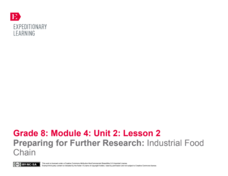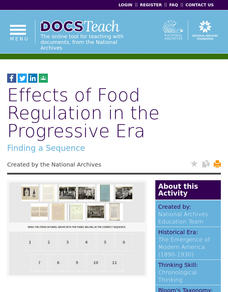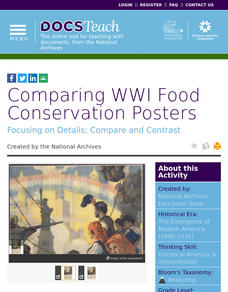State of Victoria
Making Healthy Choices, Making Healthy Food: 4-6 Curriculum Support
How much water should we drink every day? How can food preparation be both healthy and satisfying? Check out this great 10-lesson unit which not only covers the body's need for water, but also includes lessons on tasting and storing...
Smarter Balanced
Food Waste and Food Access
Forty percent of food in the US goes uneaten while 14.5 percent of US households lack a secure supply of food. As part of the preparation for a performance task assessment, groups consider statistics such as these about food waste and...
Nemours KidsHealth
Food Safety: Grades 9-12
Food poisoning, salmonellosis, E. Coli, shigellosis, tapeworms—all these words can strike fear into eaters. Alas, the five-second rule is not necessarily true! Two activities teach teens safety rules for food purchasing, preparation,...
Nemours KidsHealth
Food Labels: Grades 9-12
Check the label! That's the big idea in a lesson plan about using the nutrition facts on food labels rather than advertising hype to make healthy choices about what to eat. After reading background articles and learning how to read...
Nemours KidsHealth
Food Labels: Grades 6-8
With the help of two activities, scholars discover what's in their favorite foods by reading nutrition labels. Activity one challenges participants to write a letter to a fictional peer about the importance of making healthy choices....
Nemours KidsHealth
Food Safety: Grades 6-8
The flu or food poisoning? Middle schoolers learn how to safely prepare, cook, clean up, and store food with a lesson that has them first read articles about food safety. Partners create a video that shows them modeling these steps and...
WE Charity
High School–Module 3: Food Waste
Advances in packaging and refrigeration help keep food fresher longer. That's just one of the ways science is addressing global food waste. With the third of five lessons from the WE Are Innovators—High School Modules set, scholars use...
EngageNY
Further Research: Industrial Food Chain
Scholars extend their research of the food chain that Michael Pollan discusses in The Omnivore's Dilemma. They determine additional consequences of the food chain and add them to their Cascading Consequences charts. Additionally, pupils...
EngageNY
Adding to Cascading Consequences and Stakeholders: Hunter-Gatherer Food Chain
Could the hunter-gatherer food chain feed everyone in the United States? To consider the question, pupils use their research and add to the Cascading Consequences chart based on Michael Pollan's hunter-gatherer food chain from The...
WE Charity
Elementary–Module 3: Food Waste
Before pupils discard anymore of their uneaten vegetables, they may want to learn more about food waste. Here's a resource to help them do just that! Using discussion and video, scholars discover how innovators are tackling the issue. As...
EngageNY
Adding to Cascading Consequences and Stakeholders: Industrial Food Chain
Young researchers create a class Cascading Consequences chart to see how the industrial food chain affects people, animals, and the environment. They also work in teams to complete a Stakeholders chart for the industrial food chain model...
EngageNY
Determining Cascading Consequences Using The Omnivore’s Dilemma: Hunter-Gatherer Food Chain
Focusing on the consequences of the hunter-gatherer food chain that Michael Pollan discusses in The Omnivore's Dilemma, teams work together to create hunter-gatherer food chain consequences charts. Next, scholars view other groups'...
EngageNY
Writing a Position Speech: Which Food Chain Would Be Best?
Eeny, meany, miny, moe. It's time to choose a side. Scholars learn about taking a position by watching a video of a speech about local organic food. Next, pupils use graphic organizers to plan their speeches about which food chain is...
Smithsonian Institution
Strength in Solidarity: Coalition of Immokalee Workers and the Campaign for Fair Food
Not all food is created equal. The lesson dives into the world of migrant farm workers to show their struggles to earn livable wages and better working conditions. Academics learn why the Coalition of Immokalee Workers was created and...
EngageNY
Preparing for Further Research: Industrial Food Chain
Using an informative resource, pupils discover how to write research questions that are focused, answerable, and relevant. Scholars evaluate resources about the industrial food chain from Michael Pollan's The Omnivore's Dilemma and then...
Curated OER
Food Traditions: Making Cherokee Bean Bread
Imagine being forced out of your home and walking over 1,000 miles with only the things you could carry. How would you survive? What would you eat? After reading about the Trail of Tears and Cherokee resilience, middle schoolers are...
Curated OER
Home Living / Daily Living Lesson Plan—Mastery Healthy Food
Everyone needs to know how to eat well to stay healthy. Learners with mild disabilities log what they eat, discuss food choices, and review healthy foods. The lesson could be used to foster living skills in high-functioning individuals...
Curated OER
Pet Food Safety a Concern
Students research pet food safety laws to find out what is required in general, explore what fellow students consume, consult with veterinarian about what he or she thinks about pet food safety, present findings to classmates, and...
DocsTeach
Effects of Food Regulation in the Progressive Era
Moldy canned goods, exploding ketchup, and filthy conditions: These were some of the issues the reformers of the Progressive Era targeted with legislation such as the Pure Food and Drug Act. Using images of food factories and documents...
Teach Engineering
Powering a Device Using Food
Eat up a resource on using food to power electrical devices. Future engineers first experiment with different fruits and vegetables to determine the amount of electrical energy they provide. Based on the data, they design and create an...
DocsTeach
Comparing WWI Food Conservation Posters
Food will win the war! At least, that is what some World War I-era posters say. Using two propaganda posters—one in English and one in Yiddish—young scholars consider why the Wilson administration had the posters created. Discussion...
Baylor College
Safe Food Preparation
Who doesn't love ice cream? Make this delicious dessert with your class while learning about food preparation in the tenth instructional activity of this series. Teach about the importance of cleanliness and proper cooking techniques in...
California Academy of Science
Rapid Brainstorming: How Can We Improve Our Global Food System?
In 2018, the average fast food burger cost $2.64 while a salad averaged $4.14. Does the price difference matter to public health? Scholars consider that question and others in a brainstorming session about improving our global food...
Nemours KidsHealth
Food Allergies: Grades 3-5
In a creative writing and health assignment, your pupils will write a letter on behalf of an immune system to apologize for causing a food allergy, while also identifying what food allergies are and what types of foods can cause them.
Other popular searches
- Food Pyramid
- Food Chains
- Food Groups
- Food Webs
- Food Labels
- Food Safety
- Desert Food Chain
- Esl Lessons Food
- Animal Food Chain
- Deciduous Forest Food Chains
- Nutrition Labels
- Healthy Foods

























